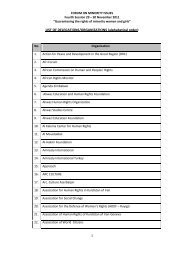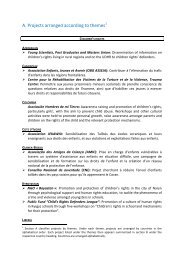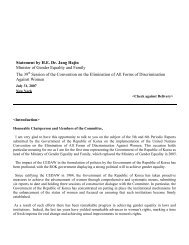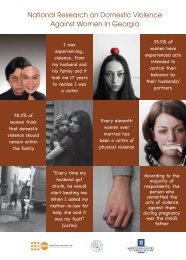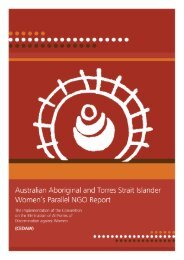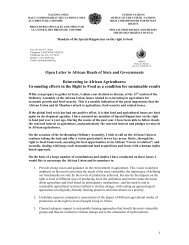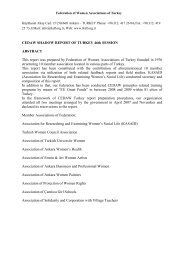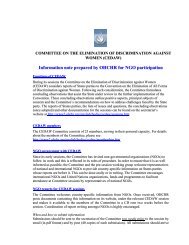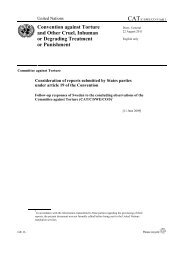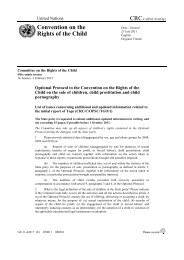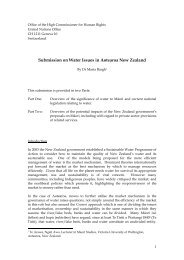Report - Office of the High Commissioner on Human Rights
Report - Office of the High Commissioner on Human Rights
Report - Office of the High Commissioner on Human Rights
- No tags were found...
Create successful ePaper yourself
Turn your PDF publications into a flip-book with our unique Google optimized e-Paper software.
Element – Security <str<strong>on</strong>g>of</str<strong>on</strong>g> tenure and freedom <str<strong>on</strong>g>of</str<strong>on</strong>g> dispossessi<strong>on</strong>:<br />
Throughout history ethnic women have lacked access and ownership <str<strong>on</strong>g>of</str<strong>on</strong>g> land and housing.<br />
The 2002 statistics show that 87.9% <str<strong>on</strong>g>of</str<strong>on</strong>g> land in Fiji is native land; 3.91% is State land; 7.94% is private<br />
freehold land; and 0.25% is Rotuma land. Access to native land (leased), ALTA, State, freehold and<br />
crown land is limited as leases are expiring and lands are being reverted to <str<strong>on</strong>g>the</str<strong>on</strong>g>ir rightful owners. Ethnic<br />
women cannot access loans and schemes to secure a lease/ownership over decent housing because<br />
it is difficult for <str<strong>on</strong>g>the</str<strong>on</strong>g>m to access collateral. 35% <str<strong>on</strong>g>of</str<strong>on</strong>g> people in Fiji are living in poverty; two thirds <str<strong>on</strong>g>of</str<strong>on</strong>g> <str<strong>on</strong>g>the</str<strong>on</strong>g>m<br />
are women.<br />
The expiry <str<strong>on</strong>g>of</str<strong>on</strong>g> land leases shows that women’s security to land tenure is very limited. A paper by Michelle<br />
Brouchu forecasted that a total <str<strong>on</strong>g>of</str<strong>on</strong>g> 13,140 farm leases will expire between 1999 -2028. The farmers will<br />
have nowhere to go and no opti<strong>on</strong> but to squat.<br />
Security <str<strong>on</strong>g>of</str<strong>on</strong>g> tenure <str<strong>on</strong>g>of</str<strong>on</strong>g> children with indigenous fa<str<strong>on</strong>g>the</str<strong>on</strong>g>rs also rests largely <strong>on</strong> <str<strong>on</strong>g>the</str<strong>on</strong>g> fa<str<strong>on</strong>g>the</str<strong>on</strong>g>r’s c<strong>on</strong>sent to register<br />
<str<strong>on</strong>g>the</str<strong>on</strong>g>m in <str<strong>on</strong>g>the</str<strong>on</strong>g> Vola Ni Kaubula.<br />
Element – Affordability:<br />
She cannot afford to buy a house, State freehold land, private freehold land or a farming lease <strong>on</strong><br />
agricultural land. She cannot access credit schemes and loans. She has no collateral.<br />
Element – Cultural appropriateness:<br />
Throughout history she has experienced reinforcement <str<strong>on</strong>g>of</str<strong>on</strong>g> male patriarchy.<br />
Ethnic male – Hindu community <str<strong>on</strong>g>of</str<strong>on</strong>g> Fiji inherits its traditi<strong>on</strong>s form <str<strong>on</strong>g>the</str<strong>on</strong>g> patriarchal, patrilineal, patrilocal<br />
North Indian Hindu pattern. Old mores in gender relati<strong>on</strong>s are still entrenched (e.g. property<br />
entitlements always go to <str<strong>on</strong>g>the</str<strong>on</strong>g> s<strong>on</strong>s, not <str<strong>on</strong>g>the</str<strong>on</strong>g> daughter). She always loses her rights to her fa<str<strong>on</strong>g>the</str<strong>on</strong>g>r’s legacy<br />
and estate.<br />
British cultural, male dominance is reinforced in <str<strong>on</strong>g>the</str<strong>on</strong>g> laws. The family law legislati<strong>on</strong> did not recognize<br />
women’s n<strong>on</strong>-ec<strong>on</strong>omic c<strong>on</strong>tributi<strong>on</strong>s to property in assessing property settlement.<br />
Fijian culture (patrilineal) entrenches patriarchy. A child born out <str<strong>on</strong>g>of</str<strong>on</strong>g> wedlock to an ethnic woman is<br />
given less recogniti<strong>on</strong> by culture. The husband has <str<strong>on</strong>g>the</str<strong>on</strong>g> title to <str<strong>on</strong>g>the</str<strong>on</strong>g> land so he is in <str<strong>on</strong>g>the</str<strong>on</strong>g> positi<strong>on</strong> to decide<br />
whe<str<strong>on</strong>g>the</str<strong>on</strong>g>r he wants to register <str<strong>on</strong>g>the</str<strong>on</strong>g> child. He has to be accountable to <str<strong>on</strong>g>the</str<strong>on</strong>g> Matagol. However, if <str<strong>on</strong>g>the</str<strong>on</strong>g> fa<str<strong>on</strong>g>the</str<strong>on</strong>g>r<br />
refuses, an indigenous woman can still enlist <str<strong>on</strong>g>the</str<strong>on</strong>g> child <strong>on</strong> <str<strong>on</strong>g>the</str<strong>on</strong>g> Vola Ni Kaubula, but an ethnic woman<br />
cannot. If <str<strong>on</strong>g>the</str<strong>on</strong>g> couple is not married, <str<strong>on</strong>g>the</str<strong>on</strong>g> fa<str<strong>on</strong>g>the</str<strong>on</strong>g>r will <str<strong>on</strong>g>of</str<strong>on</strong>g>ten not register <str<strong>on</strong>g>the</str<strong>on</strong>g> child, and an ethnic woman<br />
cannot force <str<strong>on</strong>g>the</str<strong>on</strong>g> fa<str<strong>on</strong>g>the</str<strong>on</strong>g>r to register <str<strong>on</strong>g>the</str<strong>on</strong>g> child because <str<strong>on</strong>g>the</str<strong>on</strong>g> child cannot be registered without <str<strong>on</strong>g>the</str<strong>on</strong>g> fa<str<strong>on</strong>g>the</str<strong>on</strong>g>r<br />
or family’s c<strong>on</strong>sent.<br />
Stigmatisati<strong>on</strong> <str<strong>on</strong>g>of</str<strong>on</strong>g> single women, <str<strong>on</strong>g>of</str<strong>on</strong>g> ethnic women, <str<strong>on</strong>g>of</str<strong>on</strong>g> single ethnic mo<str<strong>on</strong>g>the</str<strong>on</strong>g>rs with children. She is outcast<br />
from <str<strong>on</strong>g>the</str<strong>on</strong>g> Indian and Fijian community. The impact falls most <strong>on</strong> <str<strong>on</strong>g>the</str<strong>on</strong>g> children, <str<strong>on</strong>g>the</str<strong>on</strong>g>ir identity and <str<strong>on</strong>g>the</str<strong>on</strong>g>ir<br />
access to land.<br />
Element – Habitability:<br />
The average home <str<strong>on</strong>g>of</str<strong>on</strong>g> an ethnic, low income earner, woman today is “inadequate for herself and her<br />
children”. It is inadequate for her children’s nourishment, movement and development. Often 2 adults<br />
and 3 children are living in <str<strong>on</strong>g>the</str<strong>on</strong>g> <strong>on</strong>e room. The worst cases are women living in squatter areas. The<br />
180 WOMEN’S RIGHTS TO ADEQUATE HOUSEING AND LAND



